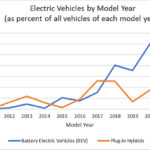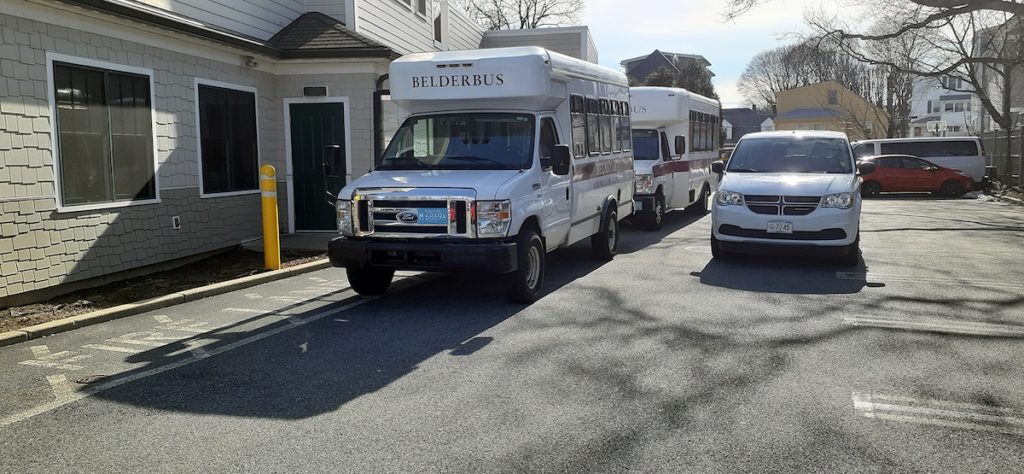
By Marty Bitner and James Booth
In 2009, Belmont’s Town Meeting committed to reducing Belmont’s emissions of the greenhouse gasses that drive dangerous climate change. In 2019, the Belmont Energy Committee put forward the Belmont Climate Action Roadmap for achieving our town’s greenhouse gas reduction goal. The general framework laid out a two-part strategy that was strongly endorsed by a vote of Town Meeting in May 2019:
- Electrify everything! (adopt electric vehicles and transition to heating with electric heat pumps)
- Move Belmont’s electricity supply to renewable sources
How are we doing with moving forward on this strategy?
Vehicles
We analyzed a list of all the vehicles that were registered in Belmont as of the beginning of 2021. Of the vehicles with 2020 and 2021 model years, 7.7% were electric (5.8% fully electric “battery electric vehicles” and 1.9% plug-in hybrids).
Is this good news? On the one hand, purchases of electric vehicles (EVs) have grown from a starting point of almost zero just a few years ago. The roadmap envisions a rapidly accelerating ramp-up of this EV adoption over the next few years, so this is a promising start. Still, it is sobering to note that over 90% of new vehicles acquired in 2020 are still powered by gasoline. Moreover, most of these are classified as “multipurpose vehicles,” a category that includes SUVs, wagons, and minivans, i.e., larger vehicles with lower gas mileage and thus higher emissions even than gasoline-powered passenger cars.
It’s important to keep in mind that it’s not so much that each electric vehicle gets us closer to achieving our emissions reduction goals; rather, each new gasoline-burning vehicle puts us farther behind. Many of these vehicles will be on the road for a decade or more, adding to our cumulative emissions throughout their whole lifetime.
In light of this fact, we hope that every Belmont resident who is considering acquiring a new vehicle will either go electric or consider waiting on their purchase until they are ready to do so. Electric vehicle options are already available today, but electric vehicle offerings continue to increase in both variety and affordability, and used electric vehicles are becoming increasingly available as well.
Heating
It is more challenging to gain insight into what is happening in terms of electrification of home heating with heat pumps. Belmont Light offers rebates for heat pumps, and in 2021 there were around 70 rebate applications. Given that there are likely several hundred replacements of heating systems in Belmont in a given year, this is promising but still a relatively small fraction. Even more so than for vehicles, installing new fossil-fuel based heating equipment risks locking in decades of emissions, so a rapid acceleration in heat pump adoption will be crucial. To support this, Belmont Light has put a new program in place to help Belmont residents navigate the potentially unfamiliar (but efficient and effective!) technology of heat pumps. General information for finding out more about heat pumps is also available at HeatSmartAlliance.org.
Belmont’s electricity supply
Belmont Light’s Power Supply Policy set out a goal of 100% renewable energy by 2022, consistent with the roadmap, and our locally owned municipal light plant is on track to achieve that important goal, with a renewable content for 2020 of 66.3% (the most recent year with complete data). Belmont Light incorporates renewable electricity into its energy portfolio by acquiring the necessary Renewable Energy Certificates (RECs ), either in combination with the electricity itself, purchased directly from renewable producers (wind, hydro, and solar), or through separate purchases of RECs.
New construction projects
While the majority of Belmont’s emissions are determined by the collective decisions of many individual households, larger projects are important both for their emissions impact and the opportunity they provide to lead by example. An important milestone in town was the design of the new Middle and High School building to be fossil-fuel free. The heat for the largest public building in town is being provided by an electrically driven ground-source heat pump (or geothermal) system. In private development, the Residences at Bel Mont, a mixed-use residential community development that has been proposed for the McLean district, will be heated entirely using air-source heat pumps.
These two large developments underscore the point that all new construction should be fossil-free. We hope that all new public buildings in Belmont, e.g., a new library or ice rink, will be both fossil fuel-free and zero-net energy (ZNE) as we move forward, and that this will become the expectation for all new construction.
The Massachusetts Department of Energy Resources is receiving public comment about its proposed revisions to state building codes. We hope that a significantly more ambitious option than the current stretch code—namely, a ZNE standard for new buildings—will be offered as an option for towns. Belmont Town Meeting passed a nonbinding resolution in June 2021 calling for just such a net-zero stretch code; this resolution reflected the members’ recognition that addressing emissions from buildings is central to achieving Belmont’s climate goals.
Municipal Vehicle Fleet
Another area in which the town can lead by example is electrifying the municipal fleet. The Energy Committee is working on an Electric Fleet Policy to increase the use of battery electric and plug-in hybrid vehicles in the town fleet. This policy would reduce greenhouse gas emissions from the town’s vehicles and also reduce the total cost of ownership over each vehicle’s lifetime.
In the long run, Belmont is going to do better financially by purchasing electricity from Belmont Light, its municipally-owned utility, to power its vehicles than buying gasoline. When procuring a new vehicle, Belmont should follow an electric-first procedure. If there is an electric vehicle available that fulfills the requirements of the town department, then it should be given priority over a gas-powered option. To get ready for the transition to electric vehicles, the town should pursue grant funding and incentives to install electric vehicle charging stations in strategic locations for town vehicle charging.
Belmont has taken many positive steps in the last couple of years. We are moving in the right direction; we just need to keep the momentum going and accelerate the pace. Residents interested in doing their part should consider electric options for themselves—heat pumps and heat-pump water heaters, electric vehicles, and induction cooktops—as well as pushing for any new buildings to be all-electric and ZNE.
Marty Bitner is chair of Belmont Drives Electric, co-chair of the Belmont Energy Committee, and a Town Meeting member. James Booth is co-chair of the Belmont Energy Committee and a co-author of its Climate Action Roadmap.





Sorry, the comment form is closed at this time.